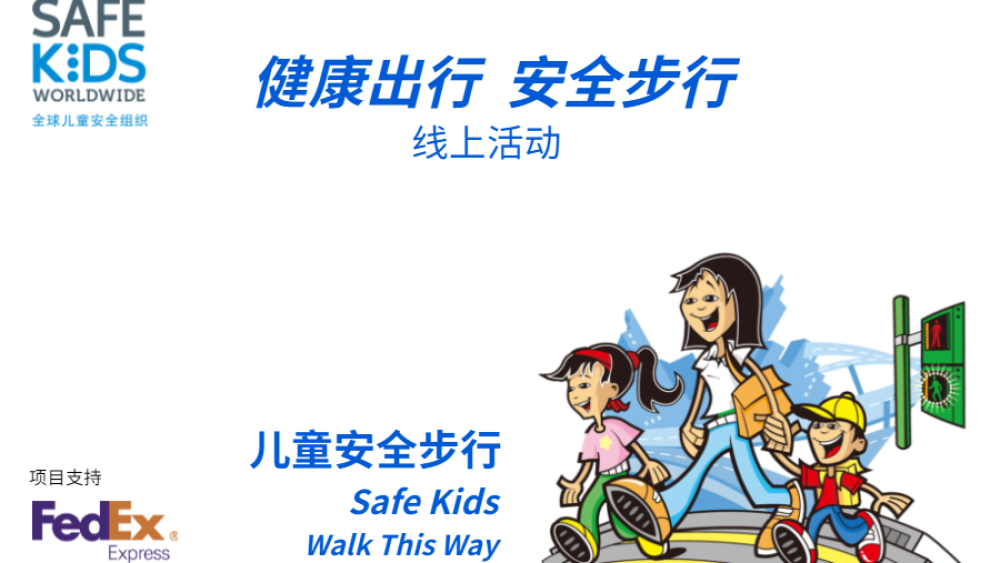Shanghai, May 13, 2020 — With more COVID-19 precautions relaxing in China, primary and secondary schools in many provinces across the country have gradually resumed classes. Committed to improving children’s walking safety for years, Safe Kids Worldwide (Safe Kids) together with FedEx Express, one of the world’s largest express transportation companies, will launch “Walk in a Safe and Healthy Way” online activity. The activity is designed to help children and teenagers stay safe and healthy as they resume classes.
The “Walk in a Safe and Healthy Way” will launch on the official WeChat platform of Safe Kids today. By watching videos and answering questions, participants will learn more about pedestrian safety and have the chance to win prizes.
This online activity targets primary and secondary school students who have returned to school or will return to school soon. The normally in-person safety courses will be offered as online interactive games so that students can learn about pedestrian safety and epidemic prevention without leaving home. The content includes information about kids’ and teenagers’ walking safety and sanitary precautions for returning to school during the epidemic. These activities are designed to provide guidance to kids and teenagers on walking safety during the epidemic, by helping them take into account personal hygiene, self-protection and the hygiene and health in public places.
FedEx volunteers have taken an active part in this online campaign by recording the instructional videos on safe walking and epidemic prevention. They transformed their care for kids’ walking safety into action and delivered their message to students all over the country.
“‘Healthy Walk’ is a kind of ‘Safe Walk’ in a broad sense,” said Monica Cui, chief representative of Safe Kids Worldwide (China). “Throughout the journey to and from school, we would like our children not only to be aware of traffic safety and avoid road collisions, but also understand the importance of self-protection and maintaining public sanitation. This will ensure that our children are safe and healthy every time they travel. That’s why we’ve included the concept of ‘Healthy Walk’ and related knowledge to the ‘Safe Kids Walk This Way’ program.”
“FedEx has partnered with Safe Kids Worldwide since 1999, and together we set up the ‘Safe Kids Walk This Way’ program, which focuses on the walking safety of kids around the world, especially in school zones,” said Eddy Chan, senior vice president, FedEx China. “After 21 years of collaboration and exploration, this program has become one of most iconic FedEx corporate social responsibility projects in the world. We launched this innovative online course in China specifically for students returning to school after the COVID-19 outbreak with the hope that it will have a positive impact on Chinese children.”
Additionally, Safe Kids Worldwide (China) has given students the following “Healthy Trip and Safe Walk” tips as they return to school.
- First, choose a proper mask and wear it correctly before going out. The selection of children’s masks needs to consider both breathability and protection. All types of masks have limited protection and need to be replaced once the mask gets wet or contaminated with secretions. Try to avoid touching the inside of the mask while wearing it. Discarded masks should be placed in special garbage bags, sealed and thrown into a garbage bin. Avoid touching the outside of the mask when discarding it. Wash hands promptly after removing a mask to avoid the spread of germs.
- Avoid crowded places when going to and from school so as to make healthy trips. In Safe Kids 2018 report on “the Current State of Electronic Device Distraction in Walking among Teenagers in Beijing, Shanghai and Guangzhou” 18.40% of the students surveyed said that their collisions were related to electronic device distraction. Distractions caused by electronic devices has become a hidden danger in teenagers’ walking safety, which cannot be ignored. We urge students to put down their mobile phones when walking, not to be distracted by electronic devices and to walk safely with their heads up.
- Wash hands frequently and keep hands clean while at school. Hands are the most exposed part of the body to germs, so regular hand washing is one of the most effective ways to prevent the spread of germs.
- The disinfection supplies at home and on campus should be used properly. The use of the right disinfectant is the basis for protection against viruses. When we use alcohol as a disinfectant, we simply need to wipe our hands with it and needn’t spray it on a large area. When using one type of disinfectant, do not mix it with other disinfectants otherwise it may produce a toxic chlorine gas or even cause death from poisoning in severe cases.
About Safe Kids Worldwide (China)
Safe Kids Worldwide (China) is committed to promoting children’s safety based on evidence-based practices in global injury prevention. Our injury prevention activities include children’s home safety, children’s medication safety, fall/burn prevention, campus entertainment and sports safety, etc. Our injury prevention work includes child injury research, policy promotion, improvement of environment, engineering, tool related, and education on children’s safety. Specific projects carried out include “Safe Kids Walk This Way”, “Child Passenger Safety”, " Hands-Only CPR”, “Child Drowning Prevention”, “Youth Safe Driving”, etc. Since we carried out first children’s safety promotion activity in China in 1999, our activities have reached more than 40 cities across the country, helping millions of children stay away from harm. “Keep children out of harm’s way and let their dreams fly” is our unchanging mission.
About FedEx Express
FedEx Express is one of the world’s largest express transportation companies, providing fast and reliable delivery to more than 220 countries and territories. FedEx Express uses a global air-and-ground network to speed delivery of time-sensitive shipments, by a definite time and date with a money-back guarantee*.
*Subject to relevant terms and conditions.
